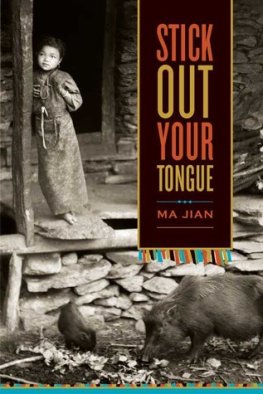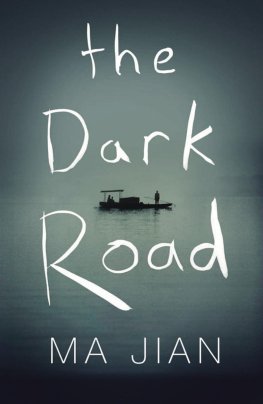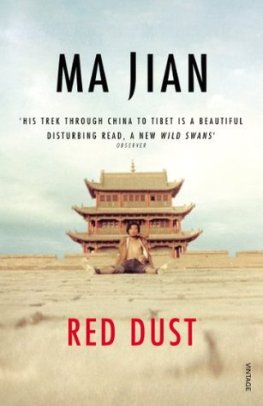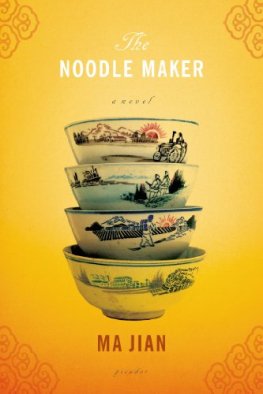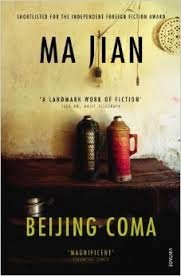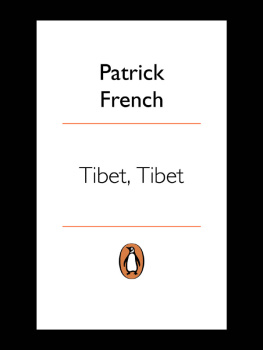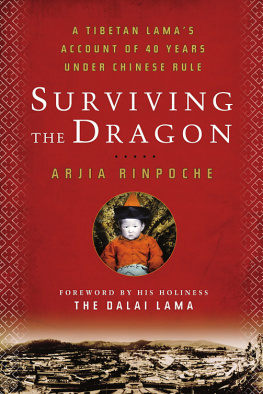Ma Jian
Stick Out Your Tongue
THE WOMAN AND THE BLUE SKY
Our bus ground to the top of the five-thousand-metre Kambala Pass. Behind us, a few army trucks were still struggling up the foothills. As the last clouds tore from the rocks and prayer stones on the summit and slipped down the gullies, Yamdrok Lake came into view. When the surface of the lake mirrored the blue sky and plunged the distant snow peaks head-first into the water, I was filled with a sudden longing to take someone in my arms. This was the mountain road to Central Tibet.
During the month that Id stayed in Lhasa, I had visited many ancient monasteries and shrines, but it was to the Jokhang Temple that Id returned most frequently. The Jokhang is Tibetan Buddhisms most venerated site. Pilgrims from every corner of Tibet circle its walls in a continual stream, spinning prayer wheels, praying for an end to their suffering in this life and a prosperous rebirth in the next. Crowds prostrate themselves before the entrance, resembling professional athletes as they hurl themselves to the ground, stand up with hands clasped in prayer, then throw themselves down again. These displays of religious fervour appeal to foreign travellers, but sky burials arouse an even greater interest. While I was staying in Lhasa, I trekked to the burial site several times, camera in hand. But I never managed to see a burial: it would either be finished by the time Id arrived, or relatives of the deceased would spot me from afar and tell me to stay away. Sometimes they even threw stones at me. I always ended up traipsing back to Lhasa in a bad mood.
I had been told that when a Tibetan dies, the relatives keep the body at home for three days, then carry it to the burial site, making sure not to look behind them as they walk. When they reach the village gates or a crossroads, they smash an earthenware jar onto the ground to ensure that the dead persons soul will never return. At the funeral site, the burial master lights a fire of fragrant juniper branches. Wealthy families employ a lama to recite from the scriptures and relate to the guardians of the Buddha Realm the merits and achievements of the deceased. Depending on the level of these achievements, the deceased will either return to the world of men, or remain in the Buddha Realm for eternity. The burial master hacks all the flesh from the corpse and slices it into small pieces. He grinds the bones into a fine powder and adds some water to form a paste. (If the bones are young and soft, he will thicken it with ground barley.) He then feeds this paste, together with the flesh, to the surrounding hawks and vultures. If the deceased was a Buddhist, a holy swastika will be carved on the corpses back. When everything has been eaten, the master presents the scalp to the relatives, and the burial is considered to be complete. After that, the only way the relatives can communicate with the deceased is to go to the temple and pray.
I was travelling to the remote countryside of Central Tibet. When the bus reached the foot of the mountain and hurtled along the shores of Yamdrok Lake, I began to feel dizzy. I opened the window. The lake was calm; there wasnt a speck of dust in the breeze. The bus, however, was crammed to the brim, and the stench of dank sheepskin that wafted from the back made it hard for me to breathe. When I could take it no longer, I told the driver to stop, and jumped out.
It was August. The Tibetan Plateaus golden month. The sky was so blue and transparent, it felt as though there was no air. I walked to the shore of the lake, put down my bag, took out a flannel and washed my face. In the distance, at the foot of a mountain, I could see the village of Nangartse. A hundred or so mud houses stood in rows along the foothills, prayer flags jutting from each roof. Above them, halfway up the mountain, was a small Buddhist temple, its walls painted in strips of red and white with a band of blue running below the eaves. Beside it were the ruins of a monastery, and a freshly whitewashed stupa, housing the ashes of a dead saint, gleaming in the sun.
It was a beautiful place. The shores of the lake were clean. The water was so clear, I could see every pebble. Beams of sunlight shone right down to the bed. The coloured prayer flags on the distant roofs moved in the wind, whispering the beauty of the Buddha Realm. Below the houses, near the shore of the lake, stood a cement hut with a red tiled roof. I assumed it was the village headquarters, and pulled out from my bag a forged introduction letter that was stamped with a red seal. As I approached, I discovered that it was not the village headquarters, it was just an ordinary brick hut. A soldier stepped out. From his accent I could tell that he was from Sichuan. He invited me to come inside and sit down, so I followed him through the door. The hut was an army repair station. The soldier had been posted here to maintain the smooth connection of the army telephone line. When the line was working, he would go fishing on the lake, and read a few kung-fu novels too, I assumed seeing the pile of them lying on the floor. He was delighted when I asked to stay. He had lived here for four years, and could speak Tibetan quite well. He often went up to the village to have a drink with the locals. A rifle hung from a nail on the wall. The room was a mess it looked like a scrap yard.
I asked if there was a burial site nearby, and he said that there was. Then I asked if there had been any burials lately. He froze for a second, and told me that a woman in the village had recently passed away. When I asked whether I might be allowed to watch the burial, the soldier muttered inaudibly then said that he needed to buy some beer. I handed him some money, but he pushed it away and walked out of the door. It occurred to me that this might be my last chance to see a sky burial: I was unlikely to come across one again in the next few days. I couldnt let this opportunity slip by.
In the evening, we opened the beers and chatted about the latest news from China. I tried to worm myself into his favour. He liked to fish, so I said that I liked fishing too, and promised that when I returned to Beijing I would send him an imported, stainless-steel fishing rod. I gave him my address and bragged that Premier Zhao Ziyang lived right next door to me. Needless to say, you could search Beijing for days and never find the address that I scribbled down for him. Then I talked about women. He listened avidly, sucking at his cigarette. I told him wild stories about todays liberated women, and in a Sichuan dialect I assured him that when he came to Beijing, I would let him sleep with my girlfriend. No problem, I said. He brushed his hand over the table, then paused and told me that the woman was only seventeen. I couldnt believe it. So young. She died of a haemorrhage during childbirth, he said. The foetus is still inside her womb.
I crushed out my cigarette. We both fell silent. The floor of the room was damp. A single bed was pushed against the wall. The bed was wooden and painted yellow; on its headboard were a red star and an army regiment number. The walls of the room were pasted with pages torn from colour magazines. A pile of hooks and electric cables lay scattered beneath the washstand behind the door. There was just one window in the room. The lower pane was covered with a sheet of newspaper. Through the upper pane, I watched the sky turn from dark blue to black. It had been a long time since Id heard a truck pass by outside.
The soldier stood up, leaned against the bed and said, You can go to the burial if you like. The people here wont mind. Most of them have never seen a camera before. Myimas two husbands certainly havent.
Whose two husbands? I asked.
The dead womans.
How come she had two husbands?

